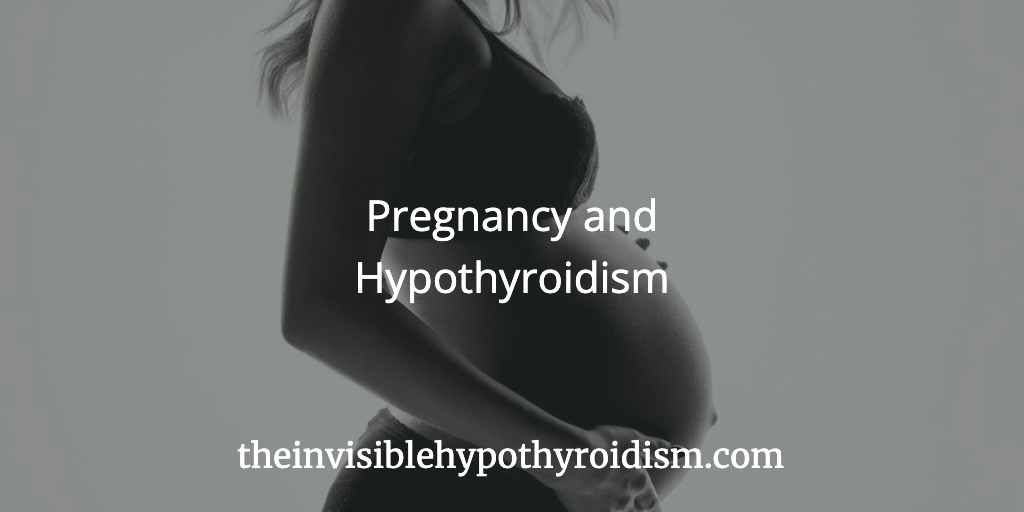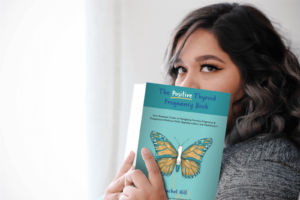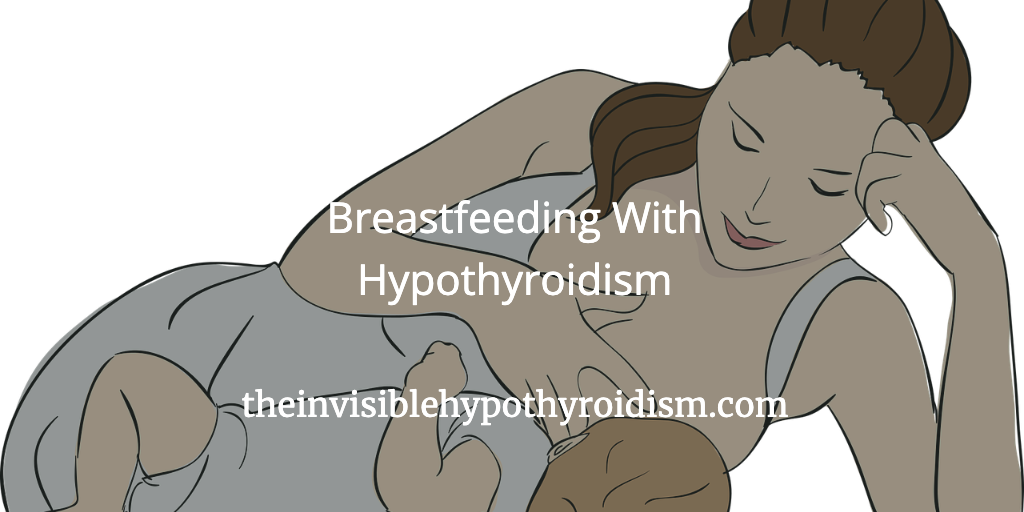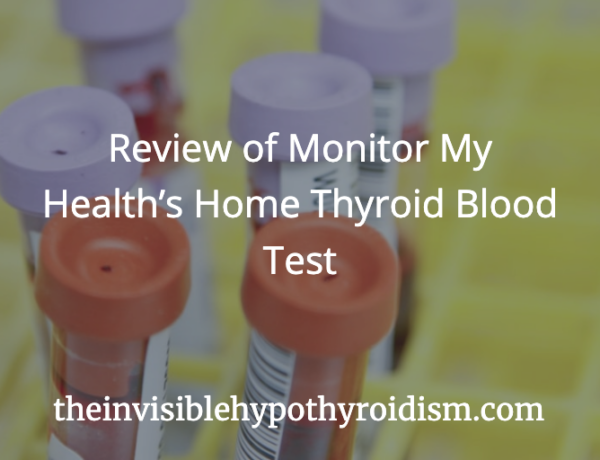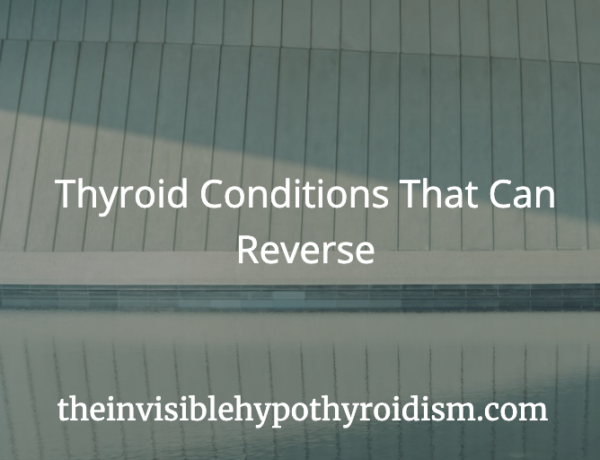Originally published on 26th June 2016 Last updated on 5th August 2024
This article covers:
- how hypothyroidism can develop during or after pregnancy
- what to do if you’re a thyroid patient who falls pregnant
- which thyroid medications are safe in pregnancy
- mental health in pregnancy
- and postpartum thyroiditis

Rachel, pregnant with her first child in 2019
Don’t forget that The Positive Thyroid Pregnancy Book: Your Essential Guide to Navigating Fertility, Pregnancy & Postpartum Wellness With Hypothyroidism and Hashimoto’s also covers my two pregnancies with hypothyroidism and Hashimoto’s in a lot of detail, while also compiling ALL the info you need to know for the best start for you and your baby.
How Can Hypothyroidism Develop During/After Pregnancy?
As pregnancy is stressful on the body, it can induce hypothyroidism. For some women, this starts during pregnancy, but it is after pregnancy that a lot are diagnosed. Some recover after a month or two, but many are left with hypothyroidism for the rest of their lives, requiring lifelong thyroid hormone replacement medication.
During pregnancy, the body goes through many hormonal changes and the immune system makes adjustments in order to preserve the foetus and not reject it as a foreign invader.
The Th-1 suppression ends after birth and this causes the immune system to surge. If it is already unstable, then this can trigger the start of Hashimoto’s Thyroiditis.
Hashimoto Thyroiditis is an autoimmune disease where the immune system attacks healthy thyroid gland tissue, slowly destroying it. This often leads to hypothyroidism. Hypothyroidism in pregnancy is usually caused by Hashimoto’s and occurs in three to five out of every 1,000 pregnancies. [1]
The thyroid gland usually enlarges with pregnancy, but not to a noticeable amount.
Additionally, if you have the autoimmune version of hypothyroidism, you’ll want to keep a check on optimally treating your hypothyroidism and lowering antibodies if possible, since some experts state that thyroid antibodies cross the human placenta and could attack your baby’s thyroid.
Research has also shown that high levels of Thyroid Peroxidase Antibodies increase the risk of premature births, so keeping Hashimoto’s well controlled can be important. [2]
See related posts:
Are Pregnant Women With Thyroid Problems Considered High Risk?
Can I Prevent My Child From Developing Hashimoto’s or Hypothyroidism?
What If I had Hypothyroidism Already but Am Now Pregnant?
If you already have the diagnosis of hypothyroidism and / or Hashimoto’s, then as soon as you know you are pregnant, tell your doctor and get a full thyroid panel booked in as soon as possible. That’s a full thyroid panel. Not just TSH and Free T4. Free T3 and thyroid antibodies too. Make it your mission to look after yourself and your baby as well as possible.
In the first trimester of pregnancy, the foetus relies completely on the mother to provide the thyroid hormones for its development. For someone with a perfectly healthy thyroid gland and function, their body is usually able to meet that extra demand easily. In a woman with hypothyroidism, her body may not be able to.
According to the Endocrine Society’s 2007 Clinical Guidelines for the Management of Thyroid Dysfunction during Pregnancy and Postpartum, thyroid medication usually needs to be increased in dosage, by 4-6 week gestation and may well require a 30-50% increase in dosage.
However, during my first pregnancy with hypothyroidism and Hashimoto’s, I didn’t require a thyroid medication dosage increase until the third trimester. Comparatively, I needed a dosage adjustment every month until I was 5 months in with my second child! So every pregnancy can differ.
A small study from 1990 revealed that although pregnant women taking Levothyroxine (Synthroid) needed an increase in dosage to maintain good thyroid hormone levels in pregnancy, women on NDT medications (such as Armour) did not need to. So this is definitely something to monitor closely and observe in regards to your personal needs. [3]
If you’re ‘subclinical’ or ‘borderline’ hypothyroid, your doctor may wish to start you on thyroid medication or increase it so that you’re well within range to reduce risk of miscarriage. The risk of miscarriage is higher in women with subclinical hypothyroidism, compared to women with normal thyroid function (euthyroidism). [4]
Subclinical hypothyroidism in the mother is also associated with a higher risk of pre-eclampsia. [5]
Most women with existing hypothyroidism require an increase in thyroid medication when pregnant, to support the developing baby. [6]
Failure to properly maintain adequate thyroid levels whilst pregnant can result in complications such as miscarriage, pre-eclampsia, anaemia, stillbirth and the baby developing congenital hypothyroidism itself. [7]
So, it’s very important to be tested regularly, often every 4-6 weeks, throughout your pregnancy. Adjustments to your medication should then be made accordingly.
Something else worth keeping in mind is that HCG (the pregnancy hormone) stimulates the thyroid, often leading to a lower TSH compared to before pregnancy. This is why test ranges change for pregnant women.
If morning sickness is interfering with how much of your thyroid medication you absorb, there are some tips listed here.
Read about the 13 Things I Did in order to Have a Healthy Pregnancy With Hashimoto’s and Hypothyroidism.
Books I found useful in my own pregnancies with thyroid disease:
- Your Healthy Pregnancy with Thyroid Disease
- The Positive Birth Book
- The Pregnancy Encyclopedia
- What to Expect When You’re Expecting
- Healing Your Body Naturally After Childbirth
- The Positive Breastfeeding Book: Everything you need to feed your baby with confidence
- Mindful Hypnobirthing: Hypnosis and Mindfulness Techniques for a Calm and Confident Birth
Related Article: 10 “Truths” About My Pregnancies with Hypothyroidism and Hashimoto’s
Thyroid Levels During Pregnancy
The American Thyroid Association (ATA) recommends the use of the following TSH test ranges during pregnancy: [8]
- First trimester: 0.1-2.5
- Second trimester: 0.2-3.0
- Third trimester: 0.3-3.0
But maintaining optimal thyroid levels for all of the thyroid panel is important, not just TSH.
The UK’s NHS uses the following ranges:
(though the exact numbers can differ slightly depending on your surgery and lab)
TSH:
(Non-pregnancy range for TSH is usually around 0.5 – 4.4 mu/L)
- 1st Trimester: 0.09 – 2.83 mu/L
- 2nd Trimester: 0.2 – 2.8 mu/L
- 3rd Trimester: 0.31 – 2.9 mu/L
Free T4:
(Non-pregnancy range for Free T4 is usually around 10 -20 pmol/L)
- 1st Trimester: 10.5 – 18.3 pmol/L
- 2nd Trimester: 9.5 – 15. 7 pmol/L
- 3rd Trimester: 8.6 – 13.6 pmol/L
Free T3:
(Non-pregnancy range for Free T3 is usually around 3.5 -6.5 pmol/L)
- 1st Trimester: 3.5 – 6.2 pmol/L
- 2nd Trimester: 3.4 – 5.8 pmol/L
- 3rd Trimester: 3.3 – 5.6 pmol/L
Thyroid advocate Hypothyroid Mom started her site in memory of the baby she lost due to her thyroid levels not being maintained correctly, and fights to stop this from happening to other women and babies. So maintaining optimal thyroid levels are important.
Some researchers believe that one factor in the development of autism is severe hypothyroidism in their mothers. [9]
Which Thyroid Medications are Safe in Pregnancy?
The need for thyroid medication (more thyroid hormone) increases during pregnancy. However, are all thyroid medications safe in pregnancy?
Thyroid medication types range from T4-only synthetics, to T3-only synthetics, to NDT’s and compounded NDT, or combining a couple of these. For example, some thyroid patients take synthetic T3 and synthetic T4 together, or synthetic T4 with NDT. In general, all thyroid medications are considered safe as long as the doctor prescribing them is using them correctly, responsibly and is monitoring the patient closely.
During pregnancy, this is much the same, except that research has not yet been conducted on pregnant women taking anything other than T4-only medications in pregnancy, therefore many doctors are not comfortable with managing a pregnant woman on anything other than T4-only medications.
There is a consensus that the growing baby does not need T3, however, whereas the baby may only need T4 medication from its mother’s supply, the mother often needs the T3 (active thyroid hormone) herself to feel well. Many people cannot function without T3-containing thyroid medication (like myself) and are unwilling to take T4-only medications.
Although T4-only medication, such as Synthroid and Levothyroxine, is the most common thyroid medication taken in pregnancy, there are many women around the world who have had successful pregnancies and healthy babies on other medications – myself included. My first child was in utero with me taking NDT (Armour Thyroid) and my second child when I was on NDT and Levothyroxine together.
I was closely monitored, with the full thyroid panel (TSH, Free T3 and Free T4) checked every 4 weeks throughout pregnancy, to ensure the dosage of my medication was correct. I was absolutely fine. All thyroid medications may be safe in pregnancy as long as the doctor prescribing them is confident and knowledgeable in using them and monitoring you closely.
Read about my first pregnancy on NDT here.
Read about my second pregnancy on NDT and Levothyroxine here.
Mental Health and Pregnancy
Although controversial, I’m going to say it: postnatal depression could actually be due to low thyroid function in some cases.
So if you have been told you have postnatal depression, it is definitely worth having a full thyroid panel tested to check your thyroid. In fact, I feel that thyroid screening should become mandatory during all pregnancies.
Whether you’re diagnosed with a thyroid condition or not, I believe that thyroid levels should be monitored. As explained above, some women develop thyroid problems during pregnancy.
I say it’s controversial to claim that some of the postnatal depression cases out there could be due to poor thyroid function, because some would suggest I am implying that postnatal depression isn’t a real thing in its own right. But it is, I acknowledge that. (I experienced it myself)
What I’m saying is that the thyroid could be responsible for at least some of these cases, because of its link to mental health. There will be women out there who have been diagnosed with postnatal depression, have hypothyroidism, and have no idea. Only testing a full thyroid panel, definitely checking the all important Free T3, will rule this out.
Some people will know they’re hypothyroid, be on medication for it, but be under-medicated (with Free T4 and Free T3 levels not being optimal) and be diagnosed with depression because of this.
If someone has postnatal depression after pregnancy, then there is a chance they may have developed Hashimoto’s and/or hypothyroidism, which is causing the symptoms.
The link is thought to involve T3, one of the hormones a healthy thyroid should be producing. T3 is the most active thyroid hormone and required for a lot of things.
T3 has an important role in the health and optimal functioning of your brain, including: your cognitive function, ability to concentrate, mood, memory and attention span and emotions and ability to cope with life’s stresses. T3 interacts with brain receptors and makes the brain more sensitive to chemicals such as Serotonin and Norepinephrine, which affects your alertness, memory, mood and emotion.
So if your doctor failed to check your thyroid levels with the correct thyroid tests (TSH, Free T3 and Free T4), when you showed signs of poor mental health, then you may have mental health issues caused by an inadequately treated thyroid problem, most likely a low T3. So postnatal depression could actually be caused by thyroid levels being out of whack.
If you have had your thyroid levels checked and been told they’re fine, make sure they are in fact optimal. It can make a lot of difference.
Postpartum Thyroiditis
Postpartum Thyroiditis is where the thyroid gland becomes inflamed after pregnancy, and this happens to about 5-7% of women, usually within a few months of giving birth. Interestingly, this is also a form of autoimmune disease. [10], [11]
This usually presents as a painless, small enlargement of the thyroid, and can cause either hyperthyroid or hypothyroid symptoms.
This can also lead to postpartum depression because of its impact on thyroid function.
Common Symptoms:
Similar to subacute thyroiditis, there are potentially two phases to postpartum thyroiditis. The inflammation and release of thyroid hormones in to the blood usually first causes symptoms of hyperthyroidism:
- Anxiety
- Increased sensitivity to heat
- Insomnia
- Irritability
- Rapid heartbeat or palpitations
- Tremor
- Unexplained weight loss
These usually occur within a few months of giving birth. It is important to figure out if it’s postpartum thyroiditis or Graves’ disease with proper testing.
As thyroid cells are continually attacked, signs and symptoms of hypothyroidism can develop:
- Lack of energy/fatigue/weakness
- Increased sensitivity to cold/cold hands and feet
- Constipation
- Dry skin
- Difficulty concentrating/brain fog/confusion
- Aches and pains
- Depression
Most women who experience postpartum thyroiditis return to normal thyroid function after about a year, however, around a third develop permanent hypothyroidism. [10], [11]
What has been your experience of pregnancy and hypothyroidism?
If you’re looking for an online support group, I came across this one: Pregnancy and Hypothyroidism on Facebook. Please note that I am not a member or admin.
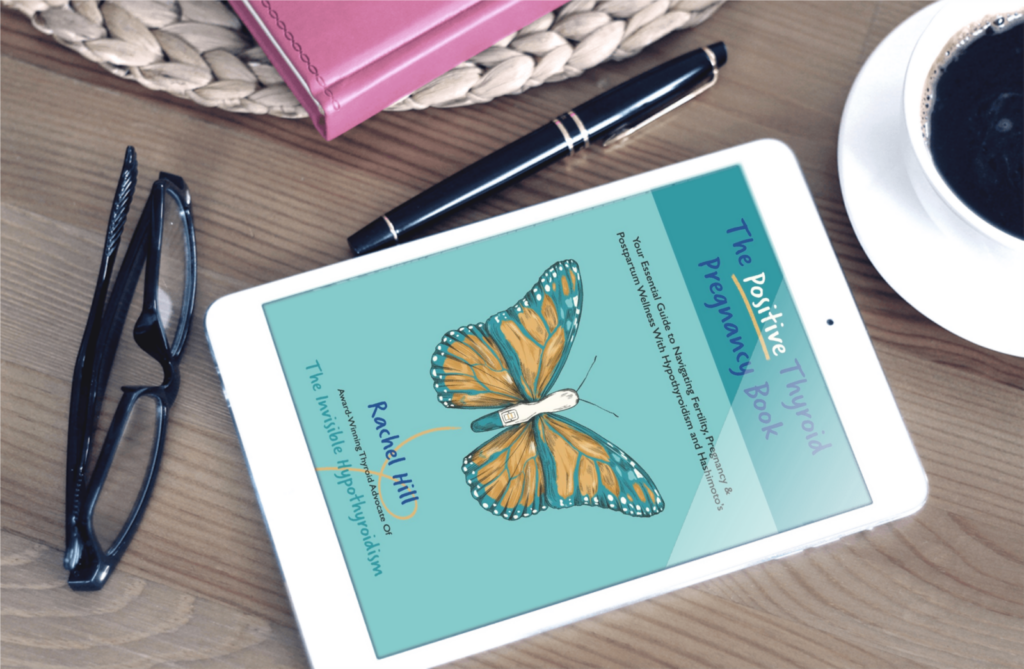
See Also:
The Positive Thyroid Pregnancy Book: Your Essential Guide to Navigating Fertility, Pregnancy & Postpartum Wellness With Hypothyroidism and Hashimoto’s which covers Rachel’s full two pregnancies with hypothyroidism and Hashimoto’s, on Levothyroxine and Armour Thyroid NDT and everything YOU need to know for the best start for you and your baby.
References:
[1] https://www.niddk.nih.gov/health-information/health-topics/endocrine/pregnancy-and-thyroid-disease/Pages/fact-sheet.aspx#pregnancy
[2] https://www.ncbi.nlm.nih.gov/pubmed/31808375
[3] https://pubmed.ncbi.nlm.nih.gov/2371025/
[4] https://www.liebertpub.com/doi/10.1089/thy.2014.0029
[5] https://www.thelancet.com/journals/landia/article/PIIS2213-8587(22)00007-9/fulltext
[6] https://www.ncbi.nlm.nih.gov/pmc/articles/PMC2533153/
[7] https://www.niddk.nih.gov/health-information/health-topics/endocrine/pregnancy-and-thyroid-disease/Pages/fact-sheet.aspx#pregnancy
[8] https://www.verywell.com/thyroid-disease-in-pregnancy-introduction-3232965
[9] https://www.thyroid.org/wp-content/uploads/publications/ctfp/volume7/issue1/ct_public_v71_3.pdf
[10] https://www.medscape.com/viewarticle/574462
[11] https://www.nhs.uk/Conditions/thyroiditis/Pages/Introduction.aspx#post-partum
[12] https://www.btf-thyroid.org/information/leaflets/38-pregnancy-and-fertility-guide

